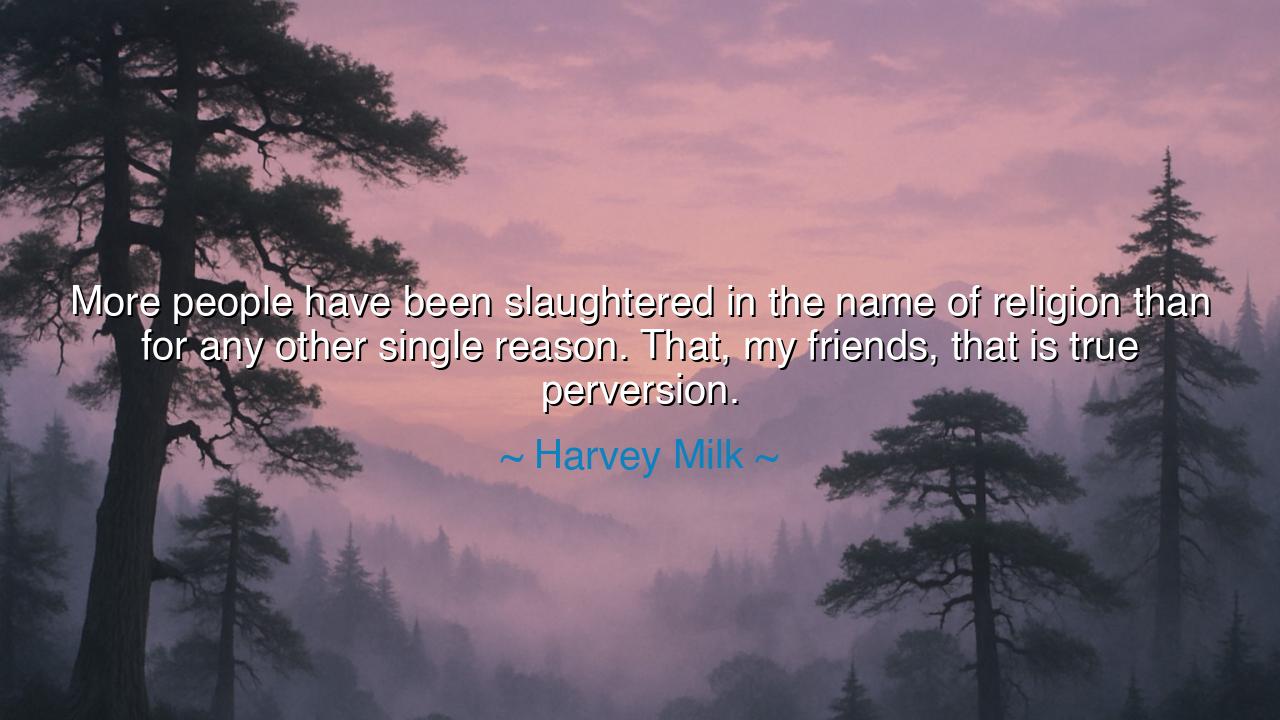
More people have been slaughtered in the name of religion than
More people have been slaughtered in the name of religion than for any other single reason. That, my friends, that is true perversion.






“More people have been slaughtered in the name of religion than for any other single reason. That, my friends, that is true perversion.” — thus thundered Harvey Milk, the prophet of love and courage, whose voice rose against hatred in an age of fear. In this searing declaration, Milk does not condemn faith itself, but the corruption of faith, the twisting of the sacred into a weapon of blood. His words are not spoken in contempt of the divine, but in defense of its purity — for he saw how religion, meant to heal and unite, had too often been used to divide, to conquer, and to destroy. He calls this “true perversion” — not the love between two souls, not the search for truth in different forms, but the act of taking what is holy and turning it against life itself.
The origin of these words comes from Milk’s lifelong struggle against intolerance — a battle not only for his own right to exist as a gay man, but for the right of all to live freely without the tyranny of moral hypocrisy. Born into a Jewish family in the shadow of the Second World War, Milk grew up in a world still reeling from the horrors of the Holocaust — a genocide justified, in part, by twisted doctrines of divine authority and racial destiny. He saw firsthand how men cloak hatred in the garments of righteousness, and how religion, when stripped of compassion, becomes a banner for cruelty. Thus, when he spoke of “slaughter in the name of religion,” he spoke as one who had witnessed humanity’s darkest contradiction: the use of God’s name to commit godless deeds.
Across the long ages, Milk’s truth echoes in history’s grim parade. The Crusades bathed the earth in blood, as soldiers marched under the cross to conquer lands and souls in the name of salvation. The Inquisition burned thinkers and mystics who dared to question dogma. Wars between faiths — Christian and Muslim, Catholic and Protestant, Hindu and Sikh — have scarred the human story for centuries. And even beyond open war, the same spirit of intolerance has silenced poets, chained philosophers, and persecuted those whose only sin was to love differently, or to pray in another tongue. The irony burns like fire: that the message of the prophets — of mercy, humility, and peace — was drowned in the shouts of armies claiming to defend them.
Milk’s words are not the bitterness of an unbeliever; they are the lament of a moral man. He saw that faith itself is not evil — for in its truest form, it teaches compassion, forgiveness, and unity. The evil lies in the perversion of belief, in the moment when the heart of faith is replaced by the hunger for power. When religion forgets its soul and becomes an instrument of dominance, it ceases to serve God and begins to serve ego. This, Milk warns us, is the greatest blasphemy: to use the language of the divine to justify hatred of His creation. For to kill in the name of love is to kill love itself.
History gives us examples not only of destruction but of redemption — those rare souls who turned faith back toward its true purpose. Consider Mahatma Gandhi, who drew strength from his Hindu heritage yet never raised a sword in its defense. He saw all religions as rivers flowing into the same sea, and through his nonviolence, he redeemed faith from fanaticism. Consider Martin Luther King Jr., who, like Milk, faced persecution from those who claimed to be righteous. Yet King, armed with his deep Christian faith, refused to meet hatred with hatred. He understood what Milk meant — that true religion is measured not by conquest, but by compassion; not by purity of creed, but by purity of heart.
Milk’s quote, then, is a warning and a call — a warning against those who claim divine sanction for cruelty, and a call for humanity to reclaim the sacred from their hands. It urges us to remember that religion, like fire, can warm or burn depending on how it is held. It is not belief itself that destroys, but the corruption of belief by pride, fear, and the thirst for control. To honor God, we must first honor the life He created — in every form, in every love, in every difference. To do otherwise is not piety; it is, as Milk said, true perversion.
So, my friends, learn this wisdom: never judge by the name of the faith, but by the fruit it bears. If it brings peace, it is holy. If it brings love, it is divine. But if it brings pain, division, or death, it has lost its light. Guard your own heart against this perversion, for it can dwell not only in temples but within each of us — in the pride that says, “I am right, and others are wrong.” Instead, cultivate humility, the truest form of worship. Question your beliefs, but never abandon kindness. Defend your convictions, but never forget your compassion.
For when the last sermon has been spoken and the last war has ended, what will remain is not creed or doctrine, but humanity itself — frail, beautiful, and sacred. Let your faith, whatever its name, be one that protects this humanity, not destroys it. Then, and only then, will religion return to its rightful purpose: not to sanctify the slaughter, but to sanctify the soul.






AAdministratorAdministrator
Welcome, honored guests. Please leave a comment, we will respond soon